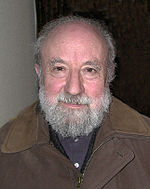- Michel Butor
-
Michel Butor 
Michel Butor in 2002Born 14 September 1926
Mons-en-Baroeul, Nord, FranceOccupation Writer Nationality French Genres Novel, criticism Notable work(s) La modification Michel Butor (French pronunciation: [miʃɛl byˈtɔʁ]; born 14 September 1926) is a French writer.
Contents
Life and work
Michel Marie François Butor was born in Mons-en-Barœul. He studied philosophy at the Sorbonne, graduating in 1947. He has taught in Egypt, Manchester, Salonika, the United States, and Geneva. He has won many literary awards for his work, including the Prix Apollo, the Prix Fénéon and the Prix Renaudot.
Journalists and critics associated his novels with the nouveau roman, but Butor himself has long resisted that association. The main point of similarity is a very general one, not much beyond that; like exponents of the nouveau roman, he can be described as an experimental writer. His best-known novel, La Modification, for instance, is written entirely in the second person.[citation needed] In his 1967 La critique et l'invention, he famously said that even the most literal quotation is already a kind of parody because of its "trans-contextualization."[1][2][3][4]
For decades now, he has chosen to work in other forms, from essays to poetry to artist's books to unclassifiable works like Mobile. Literature, painting and travel are subjects particularly dear to Butor. Part of the fascination of his writing is the way it combines the rigorous symmetries that led Roland Barthes to praise him as an epitome of structuralism (exemplified, for instance, by the architectural scheme of Passage de Milan or the calendrical structure of L'emploi du temps) with a lyrical sensibility more akin to Baudelaire than to Robbe-Grillet.
In an interview in the Museum of Modern Art, New York, conducted in 2006,[5] the poet John Ashbery describes how he wanted to sit next to Michel Butor at a dinner in New York.
Butor was a close friend and colleague of Elinor Miller, a French professor at Embry Riddle University. Butor and Miller worked collaboratively on translations and lectures. In 2002, Miller published a book on Butor entitled Prisms and Rainbows: Michel Butor's Collaborations with Jacques Monory, Jiri Kolar, and Pierre Alechinsky. [6]
Awards
- 2006 Mallarmé prize
Works
His works include:
Novels
- Passage de Milan (1954)
- L'emploi du temps (1956) (translated into English as Passing Time)
- La modification (1957) (translated into English as Second Thoughts)
- Degrés (1960)
Criticism
- Histoire extraordinaire : essai sur un rêve de Baudelaire (1961)
- Les mots dans la peinture (1969)
- Improvisations sur Flaubert (1984)
- Improvisations sur Michel Butor : l'écriture en transformation (1993)
- L'utilité poétique (1995)
- Quant au livre : triptyque en l'honneur de Gauguin (2000)
Essays
- "Répertoires [I à V]" (1960–1982)
- "Essais sur le roman"
Other genres
- Mobile : étude pour une représentation des États-Unis (1952) (translated into English as Mobile: Study for a Representation of the United States)
- Le génie de lieu (1958)
- Portrait de l'artiste en jeune singe (1967) [cf. Joyce's A Portrait of the Artist as a Young Man]
- Niagara (1969)
- Matière de rêves (1975–1985)
- Retour du boomerang (1988)
- L'embarquement de la reine de Saba (1989)
- Transit A, Transit B (1992)
References
- Jean-Louis de Rambures, "Comment travaillent les écrivains", Paris 1978 (interview with Michel Butor, in French)
- ^ A theory of parody: the teachings of twentieth-century art forms By Linda Hutcheon p.41
- ^ Allan H. Pasco (1994) Allusion: a literary graft p.217
- ^ Original quotation:
La citation la plus littérale est déjà dans une certaine mesure une parodie. Le simple prélèvement la transforme, le choix dans lequel je l'insère, sa découpure (deux critiques peuvent citer le même passage en fixant ses bords différemment), les allégements que j'opère à l'intérieur, lesquels peuvent substituer une autre grammaire à l'originelle et naturellement, la façon dont je l'aborde, dont elle est prise dans mon commentaire
- ^ Michel Butor 1981 Letters from the Antipodes p.162 quotation:
A whole ideology of ownership and transmission is implied by the commercial promotion of books and a certain kind of discourse in newspapers, schools and universities, with its emphasis on greatness, uniqueness, and influence— often via quotation— as a one-way process. This ideology has received a battering for many years now at the hands of authors such as James Joyce, Ezra Pound, Jorge Luis Borges (Pierre Menard, Author of Don Quixote) and Butor himself.
- ^ http://media.moma.org/audio/2006/pub_prog/ModernPoets_113006.mp3
- ^ The Fales Library of NYU's guide to Elinor Miller Paper
Resources
Categories:- 1926 births
- Living people
- People from Mons-en-Barœul
- French novelists
- Lycée Louis-le-Grand alumni
- Prix Renaudot winners
Wikimedia Foundation. 2010.
